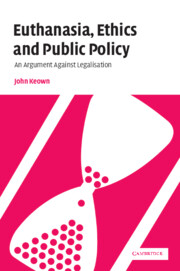Book contents
- Frontmatter
- Contents
- Preface
- Foreword
- Acknowledgments
- Table of cases
- List of abbreviations
- Introduction
- PART I Definitions
- PART II The ethical debate: human life, autonomy, legal hypocrisy, and the slippery slope
- PART III The Dutch experience: controlling VAE? condoning NVAE?
- PART IV Australia and the United States
- PART V Expert opinion
- 16 Expert committees
- 17 Supreme Courts
- 18 Medical associations
- PART VI Passive euthanasia: withholding/withdrawing treatment and tube-feeding with intent to kill
- Conclusions
- Afterword
- Bibliography
- Index
18 - Medical associations
Published online by Cambridge University Press: 20 July 2009
- Frontmatter
- Contents
- Preface
- Foreword
- Acknowledgments
- Table of cases
- List of abbreviations
- Introduction
- PART I Definitions
- PART II The ethical debate: human life, autonomy, legal hypocrisy, and the slippery slope
- PART III The Dutch experience: controlling VAE? condoning NVAE?
- PART IV Australia and the United States
- PART V Expert opinion
- 16 Expert committees
- 17 Supreme Courts
- 18 Medical associations
- PART VI Passive euthanasia: withholding/withdrawing treatment and tube-feeding with intent to kill
- Conclusions
- Afterword
- Bibliography
- Index
Summary
To please no one will I prescribe a deadly drug, nor give advice which may cause his death.
The Hippocratic OathMaintaining a tradition dating from the Hippocratic Oath in the fifth century BC forbidding doctors to give any deadly poison to patients, even if asked, the vast majority of medical associations oppose both VAE and PAS. This is reflected by the policy of the World Medical Association. In May 2001, in the wake of the passage of the Dutch euthanasia legislation, the WMA reaffirmed its strong belief that euthanasia conflicts with basic ethical principles of medical practice and called on doctors to refrain from participating in it, even when it is permitted by national law. The previous chapter outlined decisions of Supreme Courts in the UK, Canada and the USA. This chapter will outline the policies of their respective medical associations.
The British Medical Association
The BMA has consistently opposed VAE and PAS. In 1987, in response to a motion passed at its Annual Representative Meeting (ARM) the previous year urging the Association to reconsider its opposition, the Association set up a working party under the chairmanship of Sir Henry Yellowlees, a former Chief Medical Officer at the Department of Health. The Working Party identified four major arguments for VAE. The first – respect for autonomy – was rejected on the ground that autonomy has limits.
- Type
- Chapter
- Information
- Euthanasia, Ethics and Public PolicyAn Argument Against Legalisation, pp. 208 - 214Publisher: Cambridge University PressPrint publication year: 2002



